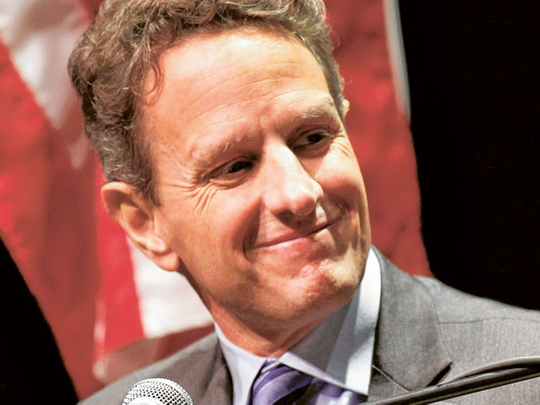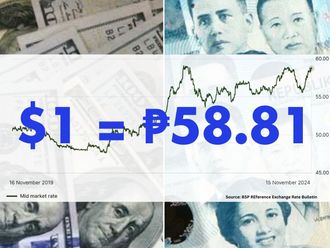
Dubai: US Treasury Secretary Timothy F. Geithner had a series of meetings with top government officials in Abu Dhabi Tuesday on the eve of the G20 meeting in Seoul that will have dollar stability high on the agenda.
Geithner flew in from India, where he was part of US President Barack Obama's entourage, and departed the same day for Singapore.
He discussed "broad developments in the global economy and [his nation's] close working relationship" with the UAE, a US embassy spokesperson told Gulf News.
Geithner met General Shaikh Mohammad Bin Zayed Al Nahyan, Crown Prince of Abu Dhabi and Deputy Supreme Commander of the UAE Armed Forces, and other senior officials. Geithner was last in Abu Dhabi in July.
"His visit comes at a time when the weakness of the dollar is creating opportunities and fears across the world," an economist told Gulf News on condition of anonymity. "The second round of quantitative easing worth $600 billion (Dh2.2 trillion) that the US announced last week is expected to find its way into emerging market assets, because that's where the returns are going to come from."
Capital flows
"On the other hand, these massive capital flows are alarming some countries, who fear that there will be an asset-price bubble," the economist said.
China has warned ahead of the G20 summit in Seoul on Thursday that Washington's policies could destabilise the global economy and inflate asset bubbles.
The US trade surplus with the UAE reached $10.6 billion in 2009. This is the fourth-largest bilateral American surplus with any country, according to the US-UAE Business Council. The UAE is also one of the world's largest purchasers of US defence products and services.
Gulf states are dealing with renewed speculation that they may consider depegging their currencies from the sliding US dollar as income from dollar-priced oil exports is being eroded.
However, the UAE Central Bank again ruled out on Monday depegging the dirham from the dollar. Last month it has announced the appointment of a high profile International Advisory Council that will provide independent advice to bank on matters related to monetary policy.
At the same time, Gulf nations are facing higher inflation as their non-dollar-denominated imports become more expensive.
"For the region, US quantitative easing means a weaker dollar and hence weaker GCC currencies. This obviously translates into upward pressures on imported goods from non-dollar zones," Philippe Dauba-Pantanacce, senior economist for Mena at Standard Chartered bank, told Gulf News recently.












